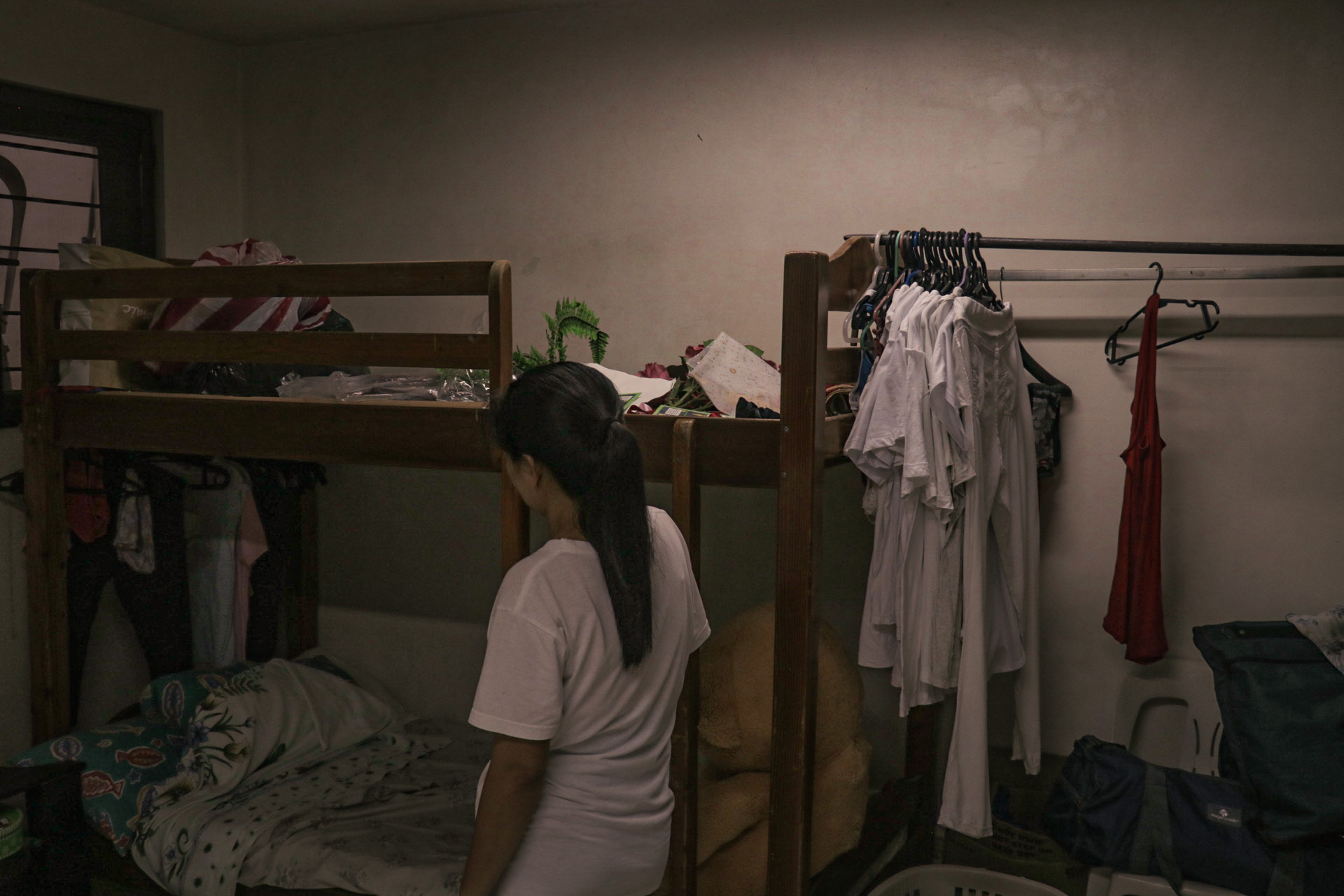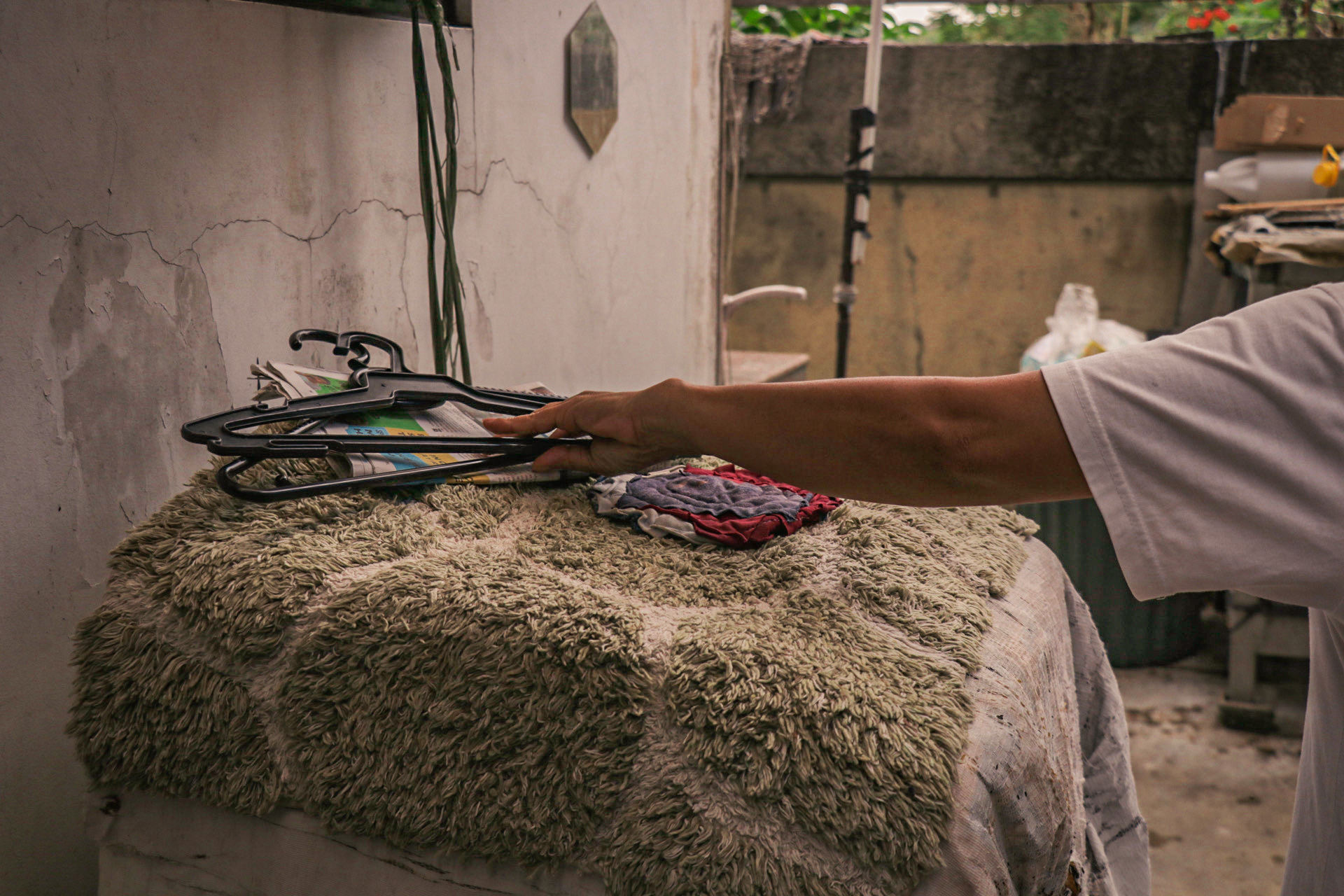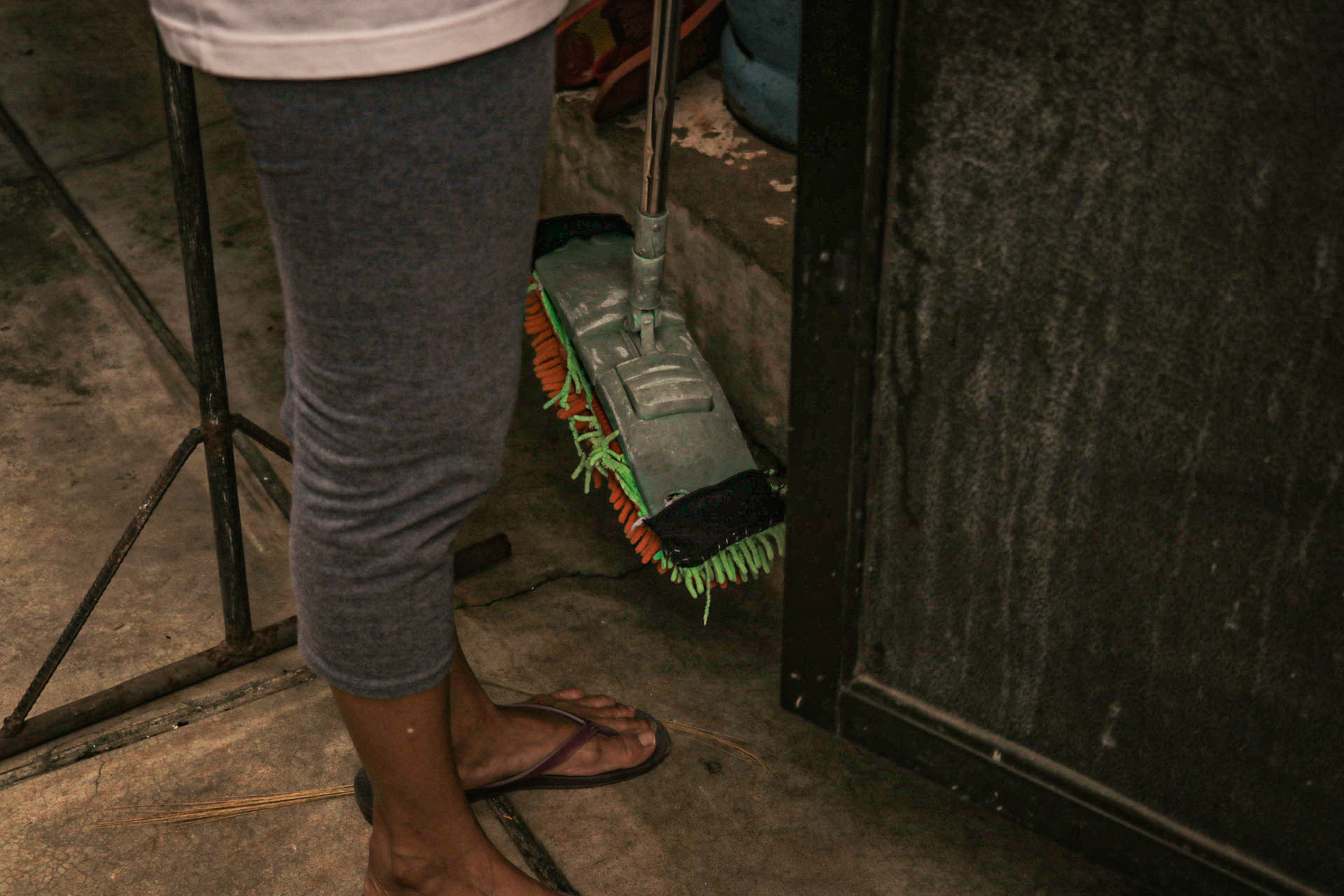The coronavirus has made a tale of two cities of every well-off Filipino household. For middle-class homeowners, the global pandemic means working from home, an abundance of Zoom calls, gimmicks that got away, and the simple torture of having to stay still for what feels like a lifetime. For their house help, however, the quarantine is just another word for the lives they’ve already been living.
Lea*, Cristina*, and Marian* work as kasambahays (house help) for a middle-class family living in a gated Marikina subdivision. Lea, 45, looks after the kids and cleans indoors; Cristina, 48, cooks every meal; and Marian, 58, cleans the gate and gardens, and cares for the family’s elderly.
Even before the pandemic struck, they were only allowed a single overnight day-off every month; they remained home for the rest of the month, day in and day out.
How did the pandemic change their lives?

“Wala naman. Sanay na kami.” (Nothing changed. We’re used to it already.)
This is Lea’s answer. Marian and Cristina agree: for these 3 women, 2020 was just another year of staying still.
It’s absurd to say out loud: there are people whose jobs essentially keep them captive in someone else’s home. I have heard too many employers say that domestic workers choose this life, that ‘it comes with the job.’
The reality, however, is that most kasambahays are forced into domestic work by poverty and cemented there by lack of access to education.
“Wala naman akong natapos na pinag-aralan,” (I didn’t finish formal schooling) stated Lea frankly when asked why she became a kasambahay. “Elementary graduate lang ako, kaya wala naman talaga…”
Cristina, who was first employed as a domestic worker at 14, also only finished elementary school. After giving birth to her son at 16 and her daughter at 17, she stopped schooling and started working to sustain her family.
What-ifs
“Kung nakapag-aral ako? Ay, ang sarap!” Cristina daydreams. “Ang ganda, ganda niyan. Sino kaya ako?” (If I had been able to study? That would have been amazing! That would have been beautiful. Who would I have become?)
Cristina would have loved to pursue culinary arts given the chance; Marian too. Lea would have loved to teach Filipino if life had only been kinder. Finding fulfillment in education or employment are only things they see in dreams— or in the lives of the people they work for.

Lea, Cristina, and Marian were unable to create connections or build networks that only education offers. Their circles are much smaller and the physical restrictions of their job make it difficult to develop relationships they already have.
“May isang anak ako na hindi ako matanggap bilang nanay niya,” shared Marian, crying over her youngest daughter, her eleventh child.
(I have a daughter who won’t accept that I am her mother.)
Since leaving her hometown of Bacolod in 2008, Marian has never had the chance to return to her bunso (youngest child).
Lea has not spent Christmas with her family in the last 20 years. As Christmas is a busy and hectic season for her employers, she’s had to stay in Metro Manila to keep the household running. Lea has lost her mother and her brother in those years, robbed of the chance to create any last nor lasting memories with them.
“[‘Kung ako ‘yung bahala,] uuwi ako talaga! Hindi ko pa na-experience ‘yun eh.”
(If it were up to me, I’d really go home! I haven’t experienced a Christmas with my family yet.)
To many Filipinos’ surprise, there is actually a Batas Kasambahay that details the lawful, rightful treatment of live-in domestic workers. Signed into law in 2013, Republic Act 10361 is the first law to recognize domestic workers as similar to employees of the formal sector. There are, however, crucial realities that the law does not consider.
One such issue is that most kasambahays come from provinces all over the country, often finding employment in the cities. The law only provides them a single day off per week, detailing no further requirements for employers to allow longer leaves for a worthwhile trip home.
Lea’s 84-year old father is all that’s left of her family back in Antique, Visayas. He’s lost his hearing, making calls close to impossible.
“Gusto ko [siyang] bigyan ng magandang birthday,” Lea shared simply. “Para ma-feel naman nila— bago sila mawala— na masaya. Never pa naghanda yung tatay ko. Surprise ko ‘yun.”
(I want to give him a birthday party so that he feels happy before he goes. He’s never had a celebration before. That’s my surprise for him.)
Family is everything for these women. Whatever they earn goes straight into the pockets of their parents, siblings, and children. Poverty does not allow respite in the material.
“Diyos ko, sa sarili ko?” (My God, for me?) Marian laughs at even the thought of self-indulgence. “Makatulong lang ako sa mga anak ko, OK na yun. Wala na akong naiisip para sa sarili ko. Makabili lang ng kain-kainin sa labas minsan, OK na. Sa mga anak lang.”
(As long as I can help my kids, I’m OK. I don’t want to think about myself. I’m OK with just the occasional meal out. I give everything else to my kids.)
Marian had actually retired prior to the pandemic, as all her kids had found employment. But when her daughter, Arlene, lost her job last year, Marian had to work again to support her daughter and her grandson. Arlene’s son, on top of being a mouth to feed, also suffers from hydrocephalus.
“Ako na ngayon nagsusuporta sa kanya,” shared Marian. “Wala kasi siyang asawa. Anak niya yun sa pagkadalaga.” (I support her now. She isn’t married. She got pregnant as a teen.)
All P7,000 of Marian’s monthly salary goes to her daughter. Not a single centavo is left to her.
Shockingly, Marian is considered lucky with the amount she earns.
The minimum wage for kasambahays in Metro Manila is P5,000 a month. That’s the highest rate in the entire country— employers of domestic workers in some regions are only required to pay them as little as P3,000 a month. The Kasambahay Act makes no mention of wage increases over time or any sort of financial security nor mobility besides making minimum wage.
Protecting kasambahays

The Kasambahay Act, besides being outdated and grossly passive, isn’t even properly implemented.
As of December 2020, the Department of Labor and Employment and the Philippine Statistics Authority (DOLE-PSA) reported that only 2.5% of the 1.4 million domestic workers nationwide possess written employment contracts as mandated by the law.
Over 80% of domestic workers have no social welfare benefits from the Social Security System (SSS), Philippine Health Insurance Corporation (PhilHealth), and the Home Mutual Development Fund.
Marian herself has not been able to secure benefits in 12 years. She, Lea, and Cristina are among the hundreds of thousands of kasambahays without written employment contracts. Without a contract, kasambahays become vulnerable to maltreatment without legal protection.
How then are kasambahays to be protected when even DOLE has admitted to being ill-equipped to enforce the law? Batas Kasambahay has been enforceable for almost 9 years and it still does close to nothing.
Even as vaccines become more and more available, Lea, Cristina, and Marian don’t necessarily have post-pandemic freedom to hope for. Their lives might continue in the same way even when (or if) the pandemic ends. Time has taught them to love the at leasts: at least I have a job, and somewhere to lay my head. Time has normalized all of this.
“Kontento na ako dito. Masaya na ako dito. Kontento na ako,” said Lea honestly, looking back on 20 years of faithful service.
(I’m content here. I’m happy. I’m content.)
For us outside their world, however, there is plenty left to do for the women we call kasambahays. As long as the middle-class home remains a tale of two cities, no vaccine could ever end the crisis that plagues Lea, Cristina, and Marian. – Rappler.com
*Real names were replaced for the protection of sources
Sofia Abrogar is a Journalism major at the University of the Philippines Diliman. When she’s not singing or watching anime, she’s an aspiring visual journalist currently serving her college’s publication as its photo editor.